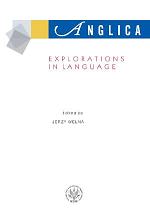FROM THE MERE DREAMER TO THE TRUE POET: JOHN KEATS’S POETIC THEORY IN THE FALL OF HYPERION
FROM THE MERE DREAMER TO THE TRUE POET: JOHN KEATS’S POETIC THEORY IN THE FALL OF HYPERION
Author(s): Małgorzata Łuczyńska-HołdysSubject(s): Literary Texts
Published by: Wydawnictwa Uniwersytetu Warszawskiego
Keywords: dream; reality; poetry; the poet; role; Moneta;
Summary/Abstract: Keats’s unfinished attempt at epic, The Fall of Hyperion (1819), deals with motifs well-known from Keats’s earlier verse: the relation between dream and reality, the function of poetry, the role of the female figure who is La Belle Dame sans Merci as much as she is the Muse. However, the main issue The Fall of Hyperion confronts is the evolution of the poet – speaker, who, if he successfully achieves his transformation, will pass from being a ‘dreamer weak,’ a ‘mere visionary’ and become ‘the true poet,’ ‘a physician to man.’ The text takes up and revises the theme which Keats dealt with in Hyperion, A Fragment, namely the mythical story of the fall of the race of the Titans who are overthrown by the Olympians. Hyperion, A Fragment begins after the battle between the Titans and the Olympians, with the Titans already fallen. Hyperion, the sun god, is the Titans’ only hope for further struggle. The narrative, divided into three sections, concentrates on the defeat of Hyperion and the ascension to power of Apollo, the Olympian god. Thus, in Book I the reader is presented with the vision of fallen Saturn who waits to be replaced, and with Hyperion threatened within his empire. In Book II we witness the council of the Titans, where the most important passage appears to be the speech of Oceanus, who proposes acceptance of their inevitable defeat. In the unfinished Book III, Apollo undergoes his transformation into the new ruling god. He meets with Mnemosyne (Memory and the mother of the Muses), in order to assume his powers and to attain immortality. Subsequently, he undergoes the process of divination by looking into Mnemosyne’s face and acquiring ‘a wonderous lesson in her silent face / knowledge enormous’ (III.112–113).
Journal: ANGLICA - An International Journal of English Studies
- Issue Year: 2009
- Issue No: 17
- Page Range: 45-54
- Page Count: 10
- Language: English

